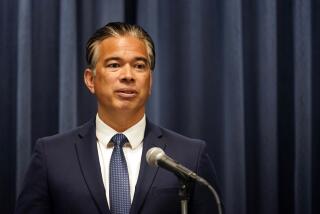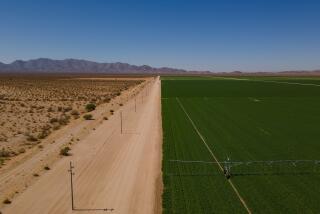SEC Probe Adds to Landmark Land Co.’s Woes : Real estate: An investigation into its accounting practices is the golf course developer’s latest regulatory problem.
- Share via
The problems are mounting at Landmark Land Co., the nationally recognized golf course developer whose operations have been hammered by growing losses in recent months.
The Carmel, Calif.-based firm recently disclosed in public documents that it is under investigation by the Securities and Exchange Commission for questionable accounting practices on a land deal last year near Palm Springs.
In connection with the probe, the firm said it may have to postpone taking more than $24 million in profits on the sale. A deferral would boost Landmark’s losses in 1989 to $61.7 million and wipe out its shareholders equity, the firm said in its annual 10-K report on file with the SEC.
Landmark’s SEC problems are the latest in a series of woes that include major losses in a savings and loan subsidiary from repossessed mobile homes, real estate foreclosures and junk bond writeoffs, the firm has disclosed.
The firm also is a victim of last year’s thrift bailout law, which in effect cut off a major source of funding, forcing it to sell or refinance its prime properties.
Landmark Land owns about two dozen golf courses around the country--including Mission Hills, PGA West and La Quinta in the Palm Springs area--as well as a savings and loan in New Orleans, known as Oak Tree Savings, that financed Landmark’s extensive development activities.
Landmark also has developed major properties in Louisiana, Oklahoma, Florida, South Carolina and throughout California. It has major developments under way in California near Riverside, Sacramento and Redlands.
Landmark is known in sporting circles as one of the nation’s premier developers of high-end golf courses. One of its best-known properties is the Oak Tree Golf Club near Oklahoma City, where the 1988 PGA golf championship was played.
The company’s principal shareholder is Gerald G. Barton, a 58-year-old native Oklahoman who owns about 29% of Landmark’s stock. Another major shareholder is Olympia & York Developments, the Toronto real estate company, which owns 25%.
The company’s stock, traded on the American Stock Exchange, has been extremely volatile, trading as high as $22.625 and as low as $6 a share in the past year. Ignored by most financial analysts, the stock closed Thursday at $17.50 a share, up $2.125. Landmark suspended its dividend last December.
Barton has run Landmark, a one-time sugar company that had major real estate holdings, for about 20 years, making money by developing golf courses--surrounded by residential homes--for a wealthy elite who spend weekends in tony places such as Palm Springs and Carmel.
“His basic premise was there is an affluent set of people who will pay astronomical prices for premier golf courses and the houses around them,” said Kenneth D. Campbell, president of Audit Investments, an investment advisory firm in Montvale, N.J.
The company, however, ran into deep trouble last year after Congress passed tough bailout legislation for the S&L; industry that placed severe restrictions on thrift investment in real estate developments.
The law shut off Landmark’s funding from Oak Tree Savings and is forcing the thrift to divest itself of more than $1 billion in real estate assets, according to Landmark Vice President Doug Barton, Gerald Barton’s son. The senior Barton was not available for comment.
The company hopes to sell most of these properties, or restructure their loans, by the end of 1990, the younger Barton said in a phone interview. Landmark already has an agreement to sell its luxurious Carmel Valley Ranch Resort to American International Golf Resorts for $60 million.
Landmark’s problems with the SEC arose after it recognized a $24.3-million profit in 1989 on a vacant piece of land near the PGA West golf course that it had sold to a real estate syndication company.
Regulators from the federal Office of Thrift Supervision, however, objected to the way the loan was structured, pointing out that the property’s down payment came from Oak Tree Savings. Regulators don’t want Landmark to recognize the full profit until additional payments on the Oak Tree loan are received.
Both Landmark and its outside auditor, Price Waterhouse, have objected to the OTS interpretation, and it’s up to the SEC to decide who is correct, Doug Barton said. The accounting dispute has also sparked a shareholder lawsuit.
The OTS also wants Landmark to increase its reserves for loan losses by another $48 million on other development loans, including one on the La Quinta Hotel.
More to Read
Inside the business of entertainment
The Wide Shot brings you news, analysis and insights on everything from streaming wars to production — and what it all means for the future.
You may occasionally receive promotional content from the Los Angeles Times.










